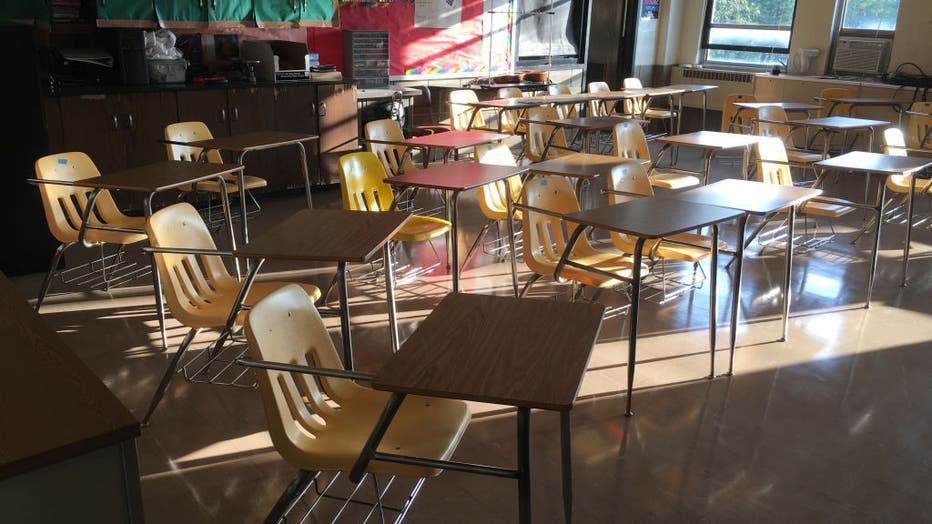Some schools are teaching teens how to sleep amid growing mental health crisis
Mental health talk: Overcoming the fear of failure
Dr. Richard Trammel, a sports therapist joins LiveNOW's Carel Lajara talks with about the mental training athletes undergo to perform well.
MANSFIELD, Ohio - Some school districts are introducing an unexpected topic to their high school curriculum: how to sleep.
In Mansfield, Ohio, and several Minnesota schools, educators are piloting sleep education programs aimed at helping teens get more rest—and, they hope, improve behavior, attendance, and mental health outcomes in the process. The initiative, reported by the Associated Press, is part of a growing response to what experts have called an adolescent sleep crisis.
Why are schools teaching teens how to sleep?
The backstory:
At Mansfield Senior High School, health teacher Tony Davis has incorporated a new sleep curriculum into a required health class, according to reporting by the Associated Press. The six-part course, called "Sleep to Be a Better You," was designed to help students understand the importance of sleep and build better nighttime habits.
"Sleep training" has long been associated with babies—but educators and health researchers are increasingly focused on teenagers, whose circadian rhythms shift during puberty, causing natural sleep delays. The CDC reports that nearly 80% of teens get less than the recommended 8–10 hours of sleep per night.
As the AP notes, the Mansfield program was launched in response to a high rate of absenteeism—still at 32% in the district, despite a drop from 44% in 2021—and parent surveys that pointed to widespread sleep struggles.
What’s the connection between sleep and mental health?
Why you should care:
Experts cited by the AP emphasize that sleep is closely linked to teen mental health, emotional regulation, and academic performance.
Denise Pope, a senior lecturer at Stanford, told the Associated Press that teen exhaustion is visible in classrooms nationwide: "Walk into any high school in America and you will see kids asleep. Whether it’s on a desk, outside on the ground or on a bench … because they are exhausted."

FILE - An empty high school classroom with rows of chairs. (Photo by: Photographer name/Education Images/Universal Images Group via Getty Images)
Research referenced in the AP’s reporting points to reduced activity in the brain’s prefrontal cortex when sleep-deprived, paired with increased amygdala activity—the part of the brain that processes fear, anxiety, and anger.
The result: more impulsive behavior, lower focus, and greater vulnerability to depression or self-harm.
How are students responding to sleep education?
What's next:
The Mansfield course, developed by a University of Minnesota researcher, encourages students to track sleep and mood, keep bedtime routines, and reduce late-night phone use. One freshman, Nathan Baker, told the Associated Press that the class changed his habits—shifting him away from screens before bed and toward calming music.
"Life is so much more simple," Baker said, after improving his sleep from five hours to seven hours a night.
The AP also reported on sophomore Amelia Raphael and senior Chase Cole—two high-achieving Mansfield students juggling academics, sports, and extracurriculars—who said they regularly sacrifice sleep due to packed schedules and the pressure to succeed.
Even with growing awareness, many teens still rely on phones as alarm clocks and fall asleep with devices in hand—habits health officials have warned against for years.
What they're saying:
Tony Davis told the Associated Press he was surprised by how many of his students didn’t know basic sleep strategies. "It might sound odd to say that kids in high school have to learn the skills to sleep," he said, "but you’d be shocked how many just don’t know how to sleep."
UCLA psychiatry professor Andrew Fuligni told the AP that sleep deserves more attention in conversations about teen mental health. "The evidence linking sleep and mental health is a lot tighter, more causal, than the evidence for social media and mental health," Fuligni said.
Kyla Wahlstrom, a University of Minnesota expert who helped develop the curriculum, added that teenagers often show sleep deprivation in subtle but familiar ways. "Teenagers have meltdowns, too, because they’re tired," she told the AP. "But they do it in more age-appropriate ways."
The Source: This article is based on reporting from the Associated Press, which interviewed students and educators at Mansfield Senior High School in Ohio and cited research from health and sleep experts.

